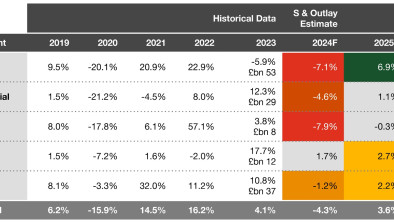PwC: Scotland in prime position to benefit from Green Jobs revolution

The demand for ‘Green Jobs’ is higher in Scotland than in any other part of the UK, and the country is also best positioned to maximise the benefits of green investment, according to PwC.
These findings come from PwC’s Green Jobs Barometer launched today - a first of its kind analysis tracking movements in green job creation, job loss, carbon intensity of employment, and worker sentiment across regions and sectors in the UK.
The transformation to a net-zero economy is beginning to feed through to the Scottish employment market, accounting for 1.65% of total advertised jobs, which is higher than in any other part of the UK. When data from all five Pillars used to create the Barometer are collated, Scotland comes out as the part of the UK best-placed to benefit economically from the shift towards a green workforce.
Overall, 1.2% of advertised positions in the UK were ‘green’, equating to 124,600 new jobs, for the year to July 2021. There remains the need for a huge scale-up in such roles if the UK is to reach its target of creating two million green jobs by 2030.
One reason for Scotland’s higher proportion is due to its strong presence of energy and utilities roles, in particular renewable energy. However, Scotland also leads the UK in green job creation within agricultural and professional services sectors.
Scotland has the greatest relative composition of green jobs within agriculture - at 17.5%. This makes the demand for green jobs within Scottish agriculture seven times the UK average.
In professional services, the density of green jobs in Scotland is almost double the UK average at 7.2%. Given the size of this sector, the higher absolute contribution it makes to the UK and Scottish labour force means that only a marginal relative increase will have a material impact on the overall number of green jobs created.
The creation of green jobs also leads to knock-on effects on wider sectors of the economy with each new green job generating a further 1.4 jobs, for example through increased demand for goods and services in the supply chain. This rises to six jobs for sectors closely aligned to the energy transition.
Scotland’s leading position does not mean it is without challenges which will need to be addressed in a transitioning economy. Scotland is projected to have the largest share of regional job losses as a result of the transition, so-called ‘sunset jobs’, with 9.4% of the total jobs expected to be lost as a result of the transition to a net zero economy. However, stepping up the pursuit of two million green jobs by 2030 will help offset any losses.
In addition, respondents to a survey conducted to help create the Barometer highlighted that Scottish employers are amongst the lowest performing for delivering workplace training, education and communications associated with the greening nature of the economy as well as yielding some of the lowest scores associated with perceptions of potential for their jobs to become more environmentally friendly in the future.
Tonnes of CO2 currently emitted per job are also higher than average in Scotland (sitting at 10.4 tonnes per employee compared to 9.1 tonnes per employee for the UK as a whole) but unlike other high performing regions such as London, it contains a relatively higher composition of labour employed in energy and utilities and mining roles, a greater relative density of manufacturing industries and more carbon intensive transport sector.
Matthew Hall, net-zero leader for PwC Scotland, said: “The findings from our Green Jobs Barometer highlights the significant opportunity for Scotland’s labour market as we transition towards a net zero economy, and emphasises the critical role Scotland must play in contributing to a greener and cleaner world.
“This opportunity will not happen by itself however. Having seen the passion around COP26 in Glasgow last month, the will to deliver is absolutely there but we need targeted investment, training and policies, and collaboration between government, business and education providers, so that a green future delivers fair opportunities for everyone.”
The Green Jobs Barometer shows that disparities are already arising in how the transition to greener jobs is affecting different parts of the UK.
Work is needed to ensure the green jobs transition doesn’t exacerbate regional inequalities. Yorkshire & the Humber, Northern Ireland and Wales are the lowest ranking regions across all aspects of the Green Jobs Barometer. At the other end London is behind Scotland as the top performer.
Kevin Ellis, chairman and senior partner at PwC, added: “Jobs are getting greener and this is cause for optimism, but evidence is needed on the level and distribution of these opportunities. Left unchecked, green employment will grow in the most fertile spots, but not necessarily where they’re needed most. Our research indicates where support and investment could yield the greatest impact.
“Green jobs in energy, utilities and manufacturing sectors have a greater knock-on effect on employment, generating further jobs. Likewise, regions including Northern Ireland and Wales may see a disproportionate rise in green energy and jobs, given their current reliance on carbon intensive fuels. By acting now, we have a massive opportunity to rebalance the economy and ensure a fair transition.”























